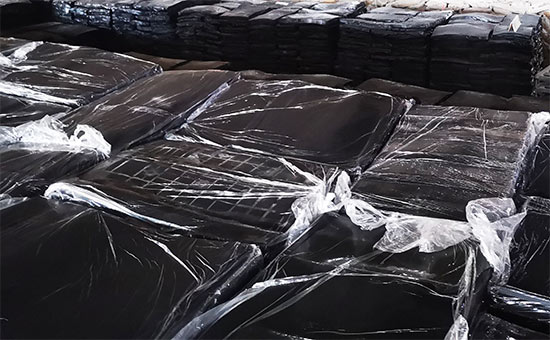
Recycled rubber has low price and good compatibility with the same type of raw rubber. Substituting high-priced raw rubber for the production of rubber products can not only reduce the cost of raw materials, but also improve the performance of rubber materials and save electricity costs. It is favored by rubber product manufacturers. But the customers of commonly used recycled rubber know that the hardness of recycled rubber will increase in winter. Why? Will the hardened recycled rubber affect the quality of recycled rubber products during use?
In fact, not only reclaimed rubber, but also all rubbers, including natural rubber and synthetic rubber, will harden under low temperature conditions in winter, which is directly related to the interaction between rubber molecules. The flexible segments between the molecules of the recycled rubber also cause thermal expansion and contraction problems. Under low temperature conditions, the distance between the rubber molecules decreases, the intermolecular force increases, the rubber molecule's movement is blocked, the modulus is high, and the flexibility of the molecular chain decreases, resulting in regeneration. The rubber hardness increases to some extent.
Rubber hardening can be divided into three types. The first is hardening due to temperature effects, the second is hardening or catalysis at the glass transition point, and the last is hardening caused by crystallization of rubber. The increase in the hardness of winter recycled rubber is theoretically caused by changes in ambient temperature. Proper adjustment of the production process conditions will basically not affect the quality of recycled rubber products and normal production efficiency.
In winter, the best storage temperature for recycled rubber is around 20 ° C, but the general warehouse temperature can not reach it, which causes the hardness of recycled rubber to increase, so that it affects the processes such as refining rubber and vulcanization. At this time, the rubber product manufacturer can transfer the reclaimed rubber to a warm room and leave it for 5-8 hours before using the reclaimed rubber, or directly heat it to room temperature before using it.
When using recycled rubber to produce rubber products in winter, in order to cope with the problem of increased rubber hardness, rubber product manufacturers can appropriately increase the amount of vulcanizing agent and accelerator 2LLYY0108 in the formula to appropriately increase the temperature of recycled rubber; it should be noted that the vulcanization temperature cannot be increased. , It is easy to cause rubber scorch, resulting in lower yield of recycled rubber products and causing unnecessary losses.
In winter, when the hardness of recycled rubber increases, the tensile strength will increase, and the elongation at break will decrease. Rubber product manufacturers must take these factors into consideration when designing the formula of recycled rubber products, and reasonably adjust the formula of recycled rubber products. In particular, the vulcanization system, the reinforcement system and the softening system can avoid the fluctuation of the quality of the recycled rubber products due to changes in the index of the recycled rubber.
Exclusive original article [commercial authorization] reprint, excerpt and excerpt in any form are prohibited without written authorization. Focus on Hongyun rubber: learn the process formula and raw material technology of producing rubber products from recycled rubber to help you reduce costs and increase profits